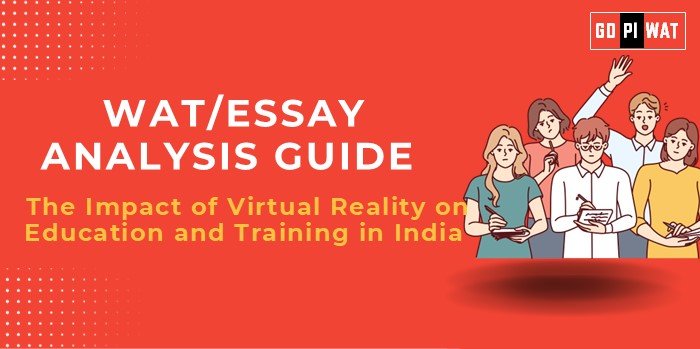📋 Written Ability Test (WAT) Analysis Guide: The Impact of Virtual Reality on Education and Training in India
🌐 Understanding the Topic’s Importance
Virtual Reality (VR) has transformed global education and training, offering immersive learning methods. In India, where education quality and access vary significantly, VR holds the promise of equity and innovation. By addressing challenges such as outdated teaching techniques and lack of interactivity, VR can be a game-changer in enhancing learning outcomes across diverse educational settings.
📋 Effective Planning and Writing
- ⏳ Time Allocation:
- Reading & Planning: 5 minutes
- Writing: 20 minutes
- Review: 5 minutes
- ✍️ Structure:
- Introduction: 60-70 words
- Body: 350-375 words
- Conclusion: 60-70 words
📖 Introduction Techniques for Essays
- ⚖️ Contrast Approach: “While India is a global IT hub, its education system still struggles with outdated methods, a gap VR can fill.”
- 💡 Solution-Based Approach: “VR, with its immersive technology, offers a transformative solution for India’s education challenges.”
🏆 Structuring the Essay Body
Achievements
- 📚 VR’s role in enhancing STEM education and skill-based training.
- 🎯 Examples: Kerala’s VR labs and BYJU’s VR modules, which showcase the practical application of immersive technologies in education.
Challenges
- 💰 Cost barriers: High prices of VR hardware make it inaccessible for many schools.
- 🌐 Rural connectivity issues: Lack of robust internet limits VR adoption in remote areas.
- 📖 Lack of VR-ready curricula: Teachers are often untrained in using VR effectively, reducing its impact.
Future Outlook
- 🤝 Potential for affordable VR solutions through public-private collaboration.
- 🏗️ Building infrastructure to integrate VR into mainstream education systems.
📊 Analyzing Successes and Shortcomings
Key Achievements
- ✨ Enhanced interactivity: Students can engage in hands-on experiences, improving retention and understanding.
- 🏡 Rural outreach: VR has the potential to bring quality education to underserved regions.
Ongoing Challenges
- 💵 High cost of VR hardware and software solutions.
- 📡 Uneven connectivity, especially in rural areas, hampers scalability.
Global Context
- 🇺🇸 USA: Successfully integrates VR in skill-based training and higher education.
- 🇨🇳 China: Leads in VR adoption in primary education, showcasing scalable models.
📌 Recommendations for Sustainable Progress
- 🤝 Partner with EdTech firms to develop affordable solutions tailored to India’s needs.
- 🎓 Focus on teacher training programs to ensure effective VR adoption in classrooms.
- 🌐 Enhance digital infrastructure, prioritizing rural and semi-urban areas.
✍️ Sample Short Essays
Balanced Perspective
“Virtual Reality (VR) is reshaping education globally, with its immersive capabilities enabling interactive learning. In India, VR has shown promise in skill training, yet high costs and infrastructure gaps remain significant barriers. Public-private collaborations are key to unlocking VR’s potential in democratizing education.”
Solution-Oriented
“India’s diverse education system demands innovative solutions like Virtual Reality (VR). While high costs challenge adoption, partnerships with startups can make VR scalable. Kerala’s success with VR labs highlights the potential of immersive learning in skill-based training.”
Global Comparison
“As the global VR market grows, India has a unique opportunity to leverage this technology in education. Learning from China’s VR initiatives, India must address cost and connectivity barriers to enable equitable education access.”


